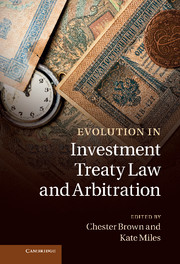Book contents
- Frontmatter
- Contents
- Contributors
- Editors' preface and acknowledgements
- Table of cases
- Table of Treaties
- Part I Introduction
- Part II Shifts in fundamental character
- Part III Actors in international investment law
- Part IV The new significance of procedure
- 15 The new rules on participation of non-disputing parties in ICSID arbitration: Blessing or curse?
- 16 The role of procedure in the development of investment law: The case of Section B of Chapter 11 of NAFTA
- 17 Navigating the parallel universe of investor–State arbitrations under the UNCITRAL Rules
- 18 The scope of ‘amount of compensation’ dispute-resolution clauses in investment treaties
- 19 Interference by a local court and a failure to enforce: Actionable under a bilateral investment treaty?
- 20 Bias challenges in investor–State arbitration: Lessons from international commercial arbitration
- Part V Engagement with cross-cutting issues
- Part VI Conclusions
- Index
- References
16 - The role of procedure in the development of investment law: The case of Section B of Chapter 11 of NAFTA
from Part IV - The new significance of procedure
Published online by Cambridge University Press: 05 December 2011
- Frontmatter
- Contents
- Contributors
- Editors' preface and acknowledgements
- Table of cases
- Table of Treaties
- Part I Introduction
- Part II Shifts in fundamental character
- Part III Actors in international investment law
- Part IV The new significance of procedure
- 15 The new rules on participation of non-disputing parties in ICSID arbitration: Blessing or curse?
- 16 The role of procedure in the development of investment law: The case of Section B of Chapter 11 of NAFTA
- 17 Navigating the parallel universe of investor–State arbitrations under the UNCITRAL Rules
- 18 The scope of ‘amount of compensation’ dispute-resolution clauses in investment treaties
- 19 Interference by a local court and a failure to enforce: Actionable under a bilateral investment treaty?
- 20 Bias challenges in investor–State arbitration: Lessons from international commercial arbitration
- Part V Engagement with cross-cutting issues
- Part VI Conclusions
- Index
- References
Summary
Introduction
Investment law, one of the fastest growing areas of international law, has emerged from the proliferation of bilateral and multilateral international investment agreements (IIAs). More than 2,600 IIAs have been negotiated, involving almost all countries. Most of these agreements provide for international arbitration as the means to settle disputes between investors and the host country.
Many scholars argue that the emergence of multiple and varied mechanisms for the settlement of economic disputes and of treaties providing for investment arbitration may be exacerbating what is called a ‘fragmentation’ process of international law. Today, economic actors seeking relief under international law may be forced to go to different courts or tribunals in order to seek compliance (i.e. conformity to the rules of a particular regime, including dispute-resolution and interpretation provisions) and/or economic compensation for the State's breach of its obligations. This may be increasing the risk that tribunals will come to inconsistent, conflicting and incompatible decisions. Faced with this danger, the question addressed in this chapter is as follows: in the absence of a homogeneous, hierarchical meta-system capable of doing away with problems derived from multiple and varied mechanisms for the settlement of economic disputes, can agreed procedural tools be a source of co-ordination?
- Type
- Chapter
- Information
- Evolution in Investment Treaty Law and Arbitration , pp. 339 - 368Publisher: Cambridge University PressPrint publication year: 2011



